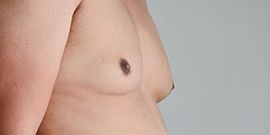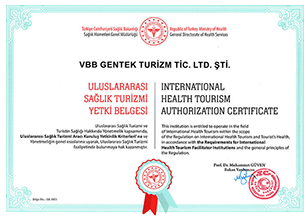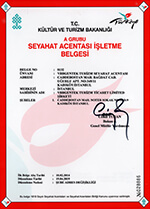Breast Lift
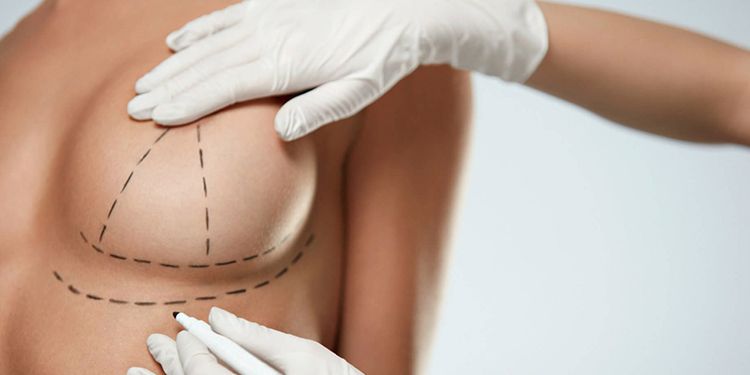
You can determine the sagging condition of your breasts by looking at the position of your nipples. If your nipples are above the breast crease, everything is fine. If your nipples are at the level of this crease, you have ”slight” breast sagging, and if your nipples are below the level of this crease, you have ”severe” breast sagging.
In this case, you may need a breast lift. Currently, there is no non-surgical method to correct breast sagging.
What is Breast Lift Surgery?
Breast lift surgery (mastopexy) is performed to correct sagging, although there is no major problem with breast volume. During the surgery, excess breast skin is removed and the breast tissue is reshaped; the nipple is brought to the ideal position and the dark colored area (areola) around the nipple is reduced. Thus, the breast is given a new uplifted form.
Why is it done?
The reasons for breast lift surgery can be listed as follows:
- The fact that the breast loses its rigidity, fat tissue inside the breast is depleted and breast sags
- The nipple points downward due to sagging
- The fact that one of the breasts gets much softer and sagged compared to the other
Why do breasts sag?
The causes of breast sagging may be listed as follows:
- Sagging may begin at an early age because of weakness of the ligaments holding the breast for hereditary reasons.
- Breasts of pregnant and breastfeeding women tend to sag to a larger extent. Because breast tissue is filled with milk during breastfeeding, it grows with the skin on it and the ligaments inbetween. When breastfeeding ends, the breast tissue, which no longer produces milk, returns to its pre-pregnancy state, but the breast ligaments and skin have lost their former firmness. Breasts sag due to loosening of the skin around the breast tissue, which returns to normal after pregnancy.
- Changes in breast volume caused by excessive weight gain and loss negatively affect the elasticity of the skin and cause sagging.
- Breast tissue decreases for hormonal reasons due to aging, which results in depletion of fat tissue in breasts and sagging.
- Gravity cannot be prevented from affecting body shape. Especially in people who do not use a bra, gravity pulls breasts downward and causes sagging.
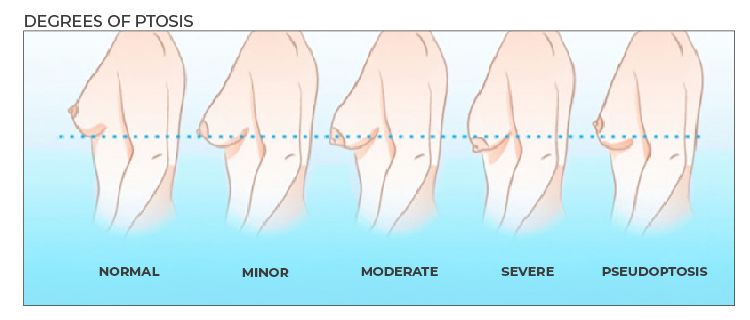
How should right breast shape and size be determined?
First of all, it is important to note that there is no ideal breast size or shape. There is a taste of breasts that can vary according to individual, age, or even culture. However, what is commonly desired in all of them is that the breasts look natural and perky.
Therefore, you should decide on the shape and size which best fit your body structure with your plastic surgeon.
How is breast lift performed?
Breast lift surgery is performed using techniques and principles similar to those of breast reduction surgery. It involves only the changes applied to the shape of the breast without reducing the breast tissue.
If necessary, enlarged dark colored area around the nipple (areola) may also be reduced during surgery.
Surgical technique may vary depending on breast type and expected shape. Generally, in the case of 1st degree sagging, if there is no excess skin, it is possible to lift and augment the breast without causing too much scar by only placing a breast implant.
In the case of 2nd and 3rd degree sagging, if there's also advanced volume loss in breast tissue, it may be necessary to remove excess skin, correct and reshape breast tissue and apply a breast implant.
How long does breast lift surgery take?
Breast lift surgery usually takes about 1.5-2.5 hours. Operation time may vary depending on the technique used and the procedure to be performed.
Is breast lift surgery a painful procedure?
In the first few days after breast lift surgery, you may have mild pain, which can be easily resolved with simple painkillers.
Type of Anesthesia
Breast lift surgery is performed by aesthetic and plastic surgeons under operating room conditions under general anesthesia applied by an anesthesiologist.
Before Breast Lift Surgery
Who can have Breast Lift Surgery?
Mostly, people who have breasts that have shrunk or softened after pregnancy or breastfeeding; people who have lost breast tissue and have sagging due to aging; people who suddenly lost excessive amounts of weight prefer this surgery.
Doctor Selection
As with other breast aesthetic operations, you should definitely consult an experienced aesthetic and plastic surgeon for breast lift surgery.
Things to consider before surgery
- First of all, you should discuss your expectation from the operation, the operative method and possible problems in detail with your plastic surgeon.
- If you have any condition, any hereditary breast disease or cancer and if you smoke, drink alcohol or take medications, you must tell these to your doctor.
- In addition, if you are under 40 years of age, you'll be asked to undergo a breast ultrasonography and if you are over 40 years of age, you'll also be asked to undergo mammography.
- During breast lift surgery, while breast tissue is being reshaped, it is removed from its location in the form of a block and moved to a different place. For this reason, it is very important that you avoid smoking before and after surgery. Smoking might impair blood circulation and cause tissue death.
- You should stop taking contraceptives, aspirin and vitamin E 10 days before and after surgery as they increase the risk of bleeding.
After Breast Lift
Things to consider after surgery
The post-operative process is usually problem free. In the first days, you may have mild pain when you move or cough, but it will remit with painkillers every day. If you restrict your arm movements, your pain will remit and you will have a positive effect on the healing process.
You'll have a bra-like bandage on your breasts. A thin tube (drain) is placed on the sides of the breasts to remove blood and fluids that may accumulate inside. Drains will be removed by day 4. Resting half-seated for 3 days after surgery will speed up your recovery.
On day 5, your dressing will be opened and dressing will be done. Mostly, absorbable stitches which do not require removal are used. If non-absorbable stitches are used, they'll be removed after day 10. Sections from which stitches have been removed should not be exposed to the sun for 6 months.
You should use a special tightening bra (sports bra) for 8 weeks after surgery.
Recovery Process
- You can start consuming liquid food 3-4 hours after the operation and you can walk around in your room.
- Even if you have mild pain in the first night, it can be easily controlled with simple painkillers.
- In the hospital process, you may have serum, analgesic and antibiotic treatment for support.
- Mostly, the drains are removed and the patient is discharged after a follow up the next day. In some cases, drains can be kept for 1-2 days if necessary.
- When you return home, you should eat plenty of liquid food, use the recommended antibiotics and painkillers and wear your special bra without removing it.
- Avoiding any activities requiring frequent arm movement and any body movements that give you pain will increase your recovery rate.
- You can have a bath 3-4 days after surgery. You can resume normal activities in one week.
- Bruising that may occur in the early period will resolve spontaneously after one week and swelling after 2-3 weeks.
- It'll take about 3 months for operation-induced swellings to completely resolve and breasts to acquire their final look.
Price of Breast Lift Surgery
The price of breast lift surgery will be decided on based on the state pf breasts and the methods to be applied to achieve the target set.
What are the risks associated with breast lift surgery?
As with any surgery, rare risk factors may occur after breast lift surgery. To avoid these surgical risks, your surgeon will take all necessary precautions.
However, despite such precautions, in rare cases, complications, including bleeding, infection, fat necrosis, delayed wound healing, loss of sensation in nipple, allergic reaction, prominent operation scar, and problems associated with general and local anesthesia may develop.
Factors such as diabetes, high blood pressure and heart diseases are among the factors that increase the risk of complications related to surgery.
Frequently asked questions about breast lift surgery
Will there be any scar left after surgery?
Scars left after breast reduction surgery are initially red, which later turn to magenta and pink. They completely fade away 6 months- 1 year after surgery. They often become barely visible. According to our observations, none of the people who were satisfied with the new look of their breasts complained about the remaining scar.
Hypertrophic scarring and keloid formation is associated with hereditary predisposition, and people with this condition whose wounds heal with excessive scarring should warn their doctor so that s/he can plan different applications to reduce the scars that may occur after surgery.
Should I have a breast lift or a breast lift+ breast implant?
If you have sagging breasts which do not have necessary volume, a breast lift surgery will not be sufficient on its own. In that case, a breast implant will be used to add volume in addition to breast lift surgery.
Can I have both breast augmentation surgery and breast lift surgery?
If necessary, breast lift and breast augmentation procedures can be performed during the same operation. Breast lift surgery (mastopexy) alone may not be enough to deliver a full appearance to the chest. In this case, at the same session as breast lift or at least 6 months later, an appropriate volume of breast implant is placed in the pocket prepared behind the breast tissue or under the chest muscle.
Can I breastfeed after Breast Lift Surgery?
To be able to breastfeed after surgery, the relationship between mammary gland, milk ducts and nipple should remain intact. It is possible to breastfeed if techniques which do not cause damage to that relationship are applied during breast lift surgery.
Is it possible to have a breast lift without surgery?
There is no permanent method of breast lift without surgery. Applying creams on the surface, massaging or chest muscle exercise do not help to improve breast sagging or breast volume.
Lifting breast using threads, which is presented as a new technique that leaves no scar, does not work well except in patients selected carefully and the effects of this method are not permanent.
When can I resume work after surgery?
You will be able to resume work within 4 to 7 days after surgery.
Will there be loss of sensation in nipple after surgery?
There may be somewhat loss of sensation in nipple and breast skin due to tissue edema developing after the operation. This usually resolves within 6 weeks; it may sometimes last for 1 year or longer; permanent loss of sensation is very rare.
Are there breast lift exercises?
It is not possible to have uplifted breasts by doing sports. This is because the chest muscle is not located inside the breast but behind it. This muscle can be developed by doing sports, but the mammary gland and fat tissue inside the breast cannot be reshaped by doing sports.
When can I travel?
You will be able to travel 5 or 7 days after surgery provided you avoid strenuous activities and arm movements.
Are the results permanent?
The results are quite long lasting. Of course, it is unlikely that the breast will remain firm and uplifted forever. Factors including not wearing a bra, pregnancy, gravity, aging and rapid weight changes may lead to new sagging in the long run.
What happens if I gain weight?
If you gain weight, the skin and ligaments on the breast lose their elasticity, which may thus give rise to new sagging in the breast. People who lead a healthy life and have a stable weight increase the permanence of the surgery.
ABOUT SURGERY
Related Content
Breast Reduction
It is an operation performed to reduce the existing volume of the breast and bring it to the ideal form targeted for aesthetic and health reasons.
Read MoreGynecomasty
Gynecomastia, a word in medical language, is a condition in which the chest region in men grow involuntarily in a similar way to women's breasts. According to research, one[...]
Read MoreBreast Reconstruction
This operation involves making a new breast in patients whose breast has been removed in part or in whole for any reason. A wide variety of methods are followed during this[...]
Read MoreBreast Augmentation
One of the most important aesthetic details of women's physics is breasts. Women who do not find their breasts beautiful may experience very important psychological problems[...]
Read More
